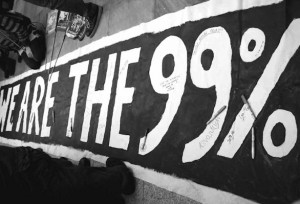The idiosyncrasy of voices within the camp, has been, thus far, one of the characterising features of the occupy movement. Our difference, have made us strong, avoiding to be pigeon holed whilst leaving passers-by and media pundits baffled at the high levels of organisation and social cohesion within the camp. However our heterogeneous identity has also hindered a wider debate within the movement, that of achieving a long-term perspective.
Under the powerful banner “We are the 99 per cent” a varied amalgam of views and people has been able to coalesce, creating truly inclusive, dissident spaces and reconstituting the realm of the possible. Our permanent nature has become an unavoidable reminder that an alternative is possible. Whilst our presence is more essential than ever, the lack of a collective vision for the future constitutes our actions, still, as largely symbolic.
Most occupiers at St Paul’s have a more or less definite idea regarding the future of the camp. For some such as Venus, who is responsible for waste management, the priority is “to stay fresh in the moment, elaborating continuity within our framework of solidarity with other occupations and with our way of working”.
Others see shortcomings in living and working on a day to day basis. Emanuel is involved in the international outreach working group, which is currently drafting a document aimed at linking occupations and assemblies across the world. He believes that “it’s normal we don’t have a strategy yet”, but then goes on to add “I believe we need one. Not only to carry on past a potential eviction, but in order to achieve a real impact on the decision making process”. He then looks at me, pauses, and elaborates “see, our actions need time, a couple of months won’t suffice in achieving this; we need a perspective”.
Mark, has been involved in the campaign for real democracy in the UK and Spain for several years and is part of the group who helped to coordinate the 15th of October date in London. He has the uttermost faith in the current process, but also feels there needs to be a strategy based around the concept of popular assemblies with actions aimed at reinforcing this. Although when going into details he admits that “some aspects might be seen as controversial from some within the camp”.
Perhaps it’s true that by taking a shape we risk alienating some within the movement, but the perils of shapelessness are just as daunting. In its current form the movement is left exposed to co-opting and manipulation, by individuals and political parties.
What the London occupations have achieved in a few weeks is baffling. Yet in order to take this forward we need to start questioning our nature and our purpose. This process of introspection is one of the greatest challenges confronting us, removing us further away from the comfort zones of our past experiences. The debate might be never ending, but only by engaging with it, do we stand a chance of achieving what no other movement has done: inventing the unknown.





